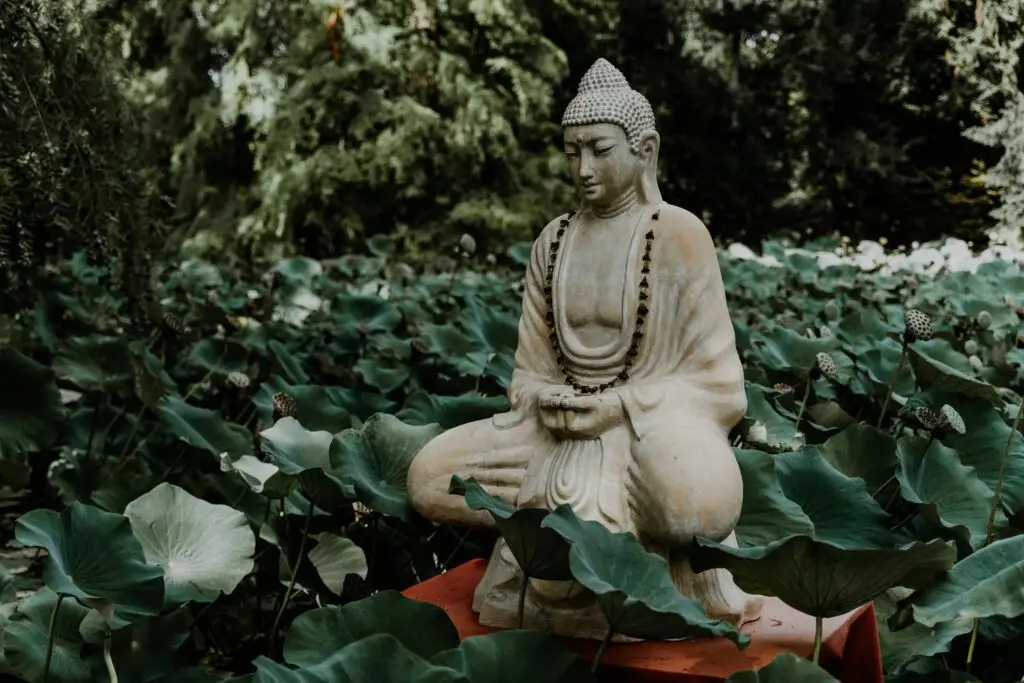We’re still shipping strong – secure, discreet delivery + free shipping over $150!

Buddhism and psychedelics, though rooted in vastly different traditions, share striking parallels in their ability to deepen self-awareness, challenge perceptions of reality, and alleviate human suffering. Over the past few decades, the conversation around their intersection has grown, fueled by groundbreaking psychedelic research and the timeless relevance of Buddhist teachings. By examining their commonalities, historical overlap, and emerging synergies, we gain insight into how these paths might harmonize to foster healing and spiritual growth.
Both psychedelics and Buddhist meditation practices encourage the dissolution of the ego, fostering a profound sense of unity and interconnectedness. Psychedelic experiences often dissolve the boundaries between self and other, an effect that aligns closely with Buddhist teachings of sunyata (emptiness) and anatta (non-self). In both practices, the ego is recognized as an illusion that perpetuates suffering. By transcending this illusion, individuals may experience a deeper connection to the world around them.
Buddhism offers structured techniques, such as meditation and mindfulness, to explore the depths of human consciousness. Psychedelics, on the other hand, provide rapid access to altered states of awareness, allowing users to glimpse expanded perspectives that might otherwise take years of disciplined practice to achieve. While the tools are different, the goal—a deeper understanding of the mind—remains strikingly similar.
Central to Buddhism is the alleviation of suffering through mindfulness, compassion, and the Eightfold Path. Similarly, modern psychedelic-assisted therapies aim to treat conditions like depression, anxiety, and PTSD. Both approaches recognize the transformative potential of addressing the root causes of mental distress, whether through meditative insight or therapeutic breakthroughs induced by substances like psilocybin.
The 1960s counterculture movement saw the first prominent exploration of psychedelics as spiritual tools, thanks in part to figures like Timothy Leary and Ram Dass (formerly Richard Alpert). These pioneers drew heavily from Eastern philosophies, particularly Buddhism, as they sought to frame psychedelic experiences within a broader spiritual context.
Not all Buddhist teachers embraced psychedelics, but some were open to exploring their potential. Alan Watts, a philosopher and Zen enthusiast, famously discussed psychedelics as tools to glimpse the states of awareness Buddhism seeks to cultivate. While traditional Buddhism emphasizes disciplined practice over shortcuts, figures like Watts suggested that psychedelics could serve as an entry point to deeper spiritual inquiry.
In contemporary therapy, psychedelics are often paired with mindfulness practices inspired by Buddhism. Techniques like breathwork, body scanning, and present-moment awareness complement the introspective nature of substances like psilocybin and MDMA, creating a holistic approach to healing.
For many, psychedelics act as a gateway to spirituality. A profound psychedelic experience can spark curiosity about meditation or Buddhist philosophy, leading individuals to adopt practices that sustain the insights they’ve gained.
A growing number of retreat centers worldwide are beginning to experiment with combining guided meditation sessions and psychedelic ceremonies in safe, intentional settings. These retreats often emphasize integration, encouraging participants to apply their experiences to everyday life while grounding them in the teachings of mindfulness and compassion.
While psychedelics can provide powerful moments of transcendence, these insights are often fleeting. In contrast, Buddhism emphasizes the importance of gradual, sustained transformation through consistent practice. Without proper integration, psychedelic experiences may become isolated flashes of insight rather than catalysts for long-term growth.
The unpredictability of psychedelics can sometimes conflict with Buddhism’s emphasis on clarity and mindfulness. A bad trip, for example, might hinder rather than enhance meditative progress. Ethical considerations also arise around the use of substances in contexts that may deviate from traditional Buddhist teachings.
As psychedelics gain acceptance for their therapeutic and spiritual potential, their relationship with Buddhism continues to evolve. The challenge lies in balancing these tools, ensuring that the wisdom of ancient teachings is not overshadowed by the allure of quick transformation. By blending the structured discipline of Buddhist practice with the transformative potential of psychedelics, a holistic approach to healing and self-discovery may emerge.
At Good Friday Wellness, we believe in exploring the intersections of tradition and innovation. Whether through mindfulness, meditation, or the transformative potential of psychedelic-assisted therapies, there are many paths to understanding consciousness and alleviating suffering.
Whether you’re seeking mindfulness, clarity, or tools for personal growth, Good Friday Wellness is here to guide your journey. Discover our range of wellness products designed to complement meditative and introspective practices, and take the next step toward deeper understanding.
🌿 Visit Our Shop to explore our offerings.
✨ Learn More about psychedelics, mindfulness, and self-discovery on our blog.
Your path to self-awareness and healing starts here. Let’s take it together.
Embracing Wellness as the Standard.
Can we email you our quick start guide and a discount on your first order?
Wellness Reimagined, Life Redefined.
We are excited to support your major wellness shifts with modest doses.
By submiting you agree to our privacy policy. Your information is safe with us and you can unsubscribe at any time.
Harmonize Your Health, Naturally.
Almost done! We’ve just sent you an email to confirm your address.